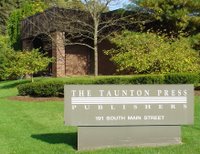
The host of my internship is the Taunton Press, in Newtown, CT (the photo on the right is actually the rear of the building, the only place there's any external identification). You may remember Peter Chapman, one of their book editors, from his appearance at our August ’05 residency. Taunton publishes an array of books and magazines ranging from cooking and sewing to woodworking and home construction. Among their magazine offerings is Fine Homebuilding (FHB), an attractive, pricey ($7.99 per issue), bimonthly glossy with a circulation averaging 300,000. It covers a broad spectrum of topics ranging from circular saw comparison tests to examples of ingenious home architecture solutions. I’ll be working on Fine Homebuilding one day a week, under the wing of Editor Kevin Ireton.
I originally met Kevin while interviewing at Taunton for a full-time job a bit over two years ago. I didn’t land the job because (my rationale follows…) I lacked their requisite “passion for construction.” I did like the people I met, however, and thought of Taunton when the internship requirement loomed. Kevin remembered me – “You built a deck behind your house, didn’t you?” – and was ready to overlook my misplaced passions in light of my offer to work gratis. After the better part of a month, during which Taunton HR established that they could, in fact, allow someone to work for free on their premises, I was in. Clearly, this is a new arrangement, for all concerned.
What I know about magazine publishing comes from my stint as an intern at WCSU’s Communique (the official campus newsletter, contrasted with Echo, the necessarily subversive student rag), which I undertook to research TEP. I have no illusions that the vastly different publications, FHB and Communique, have similar levels of editorial complexity, but I assume that a number of functions are common to both: content generation, content acquisition, iterative editing, creative (drawing, photography) input, page layout and submission to print. I want to observe all of these functions, to understand the totality. Based on my background and interests, I want to participate in content generation, editing, and photography, to learn how it’s done in this particular environment, which is (hopefully) representative of magazines, in general.
What I don’t know about the field is the practical application of my normally standalone skills, when they’re applied in an interactive, deadline-driven group. Editing articles submitted by architects who are literate, but not always engaging, will require learning (and practicing) sensitivity required by the FHB culture. Creation of original content will require learning the voice (or voices) used in the various departments in the magazine. Photography of home interiors and exteriors will entail angles, lighting, and work with creative services that are all new to me. Unfortunately, Taunton doesn’t use fascinating textures and geometrics when showcasing a homebuilt circular staircase, so my photographic instincts need to be redirected. All of the educational points are adaptations/extensions of my technical and people skills, but their application in a commercial publishing environment should be illuminating.
I’m hoping to get a good look at the magazine industry for future career choices. Come next May, I might be looking at Taunton as an employer (if I grow passionate about construction), or I might be using them as a line on my resume.